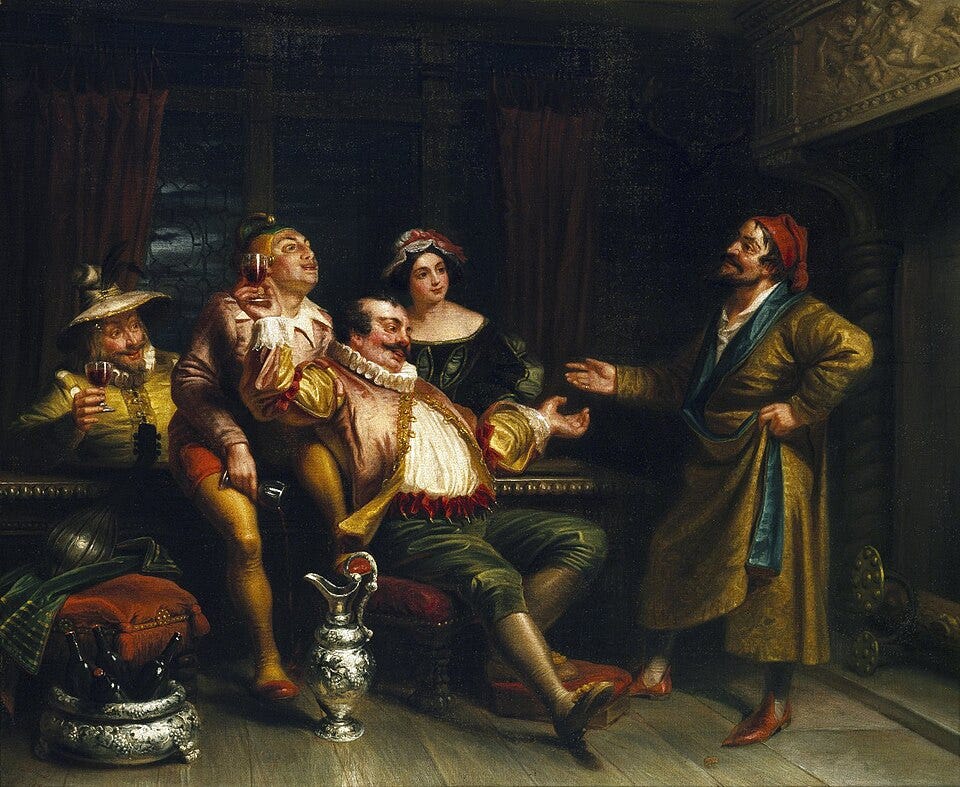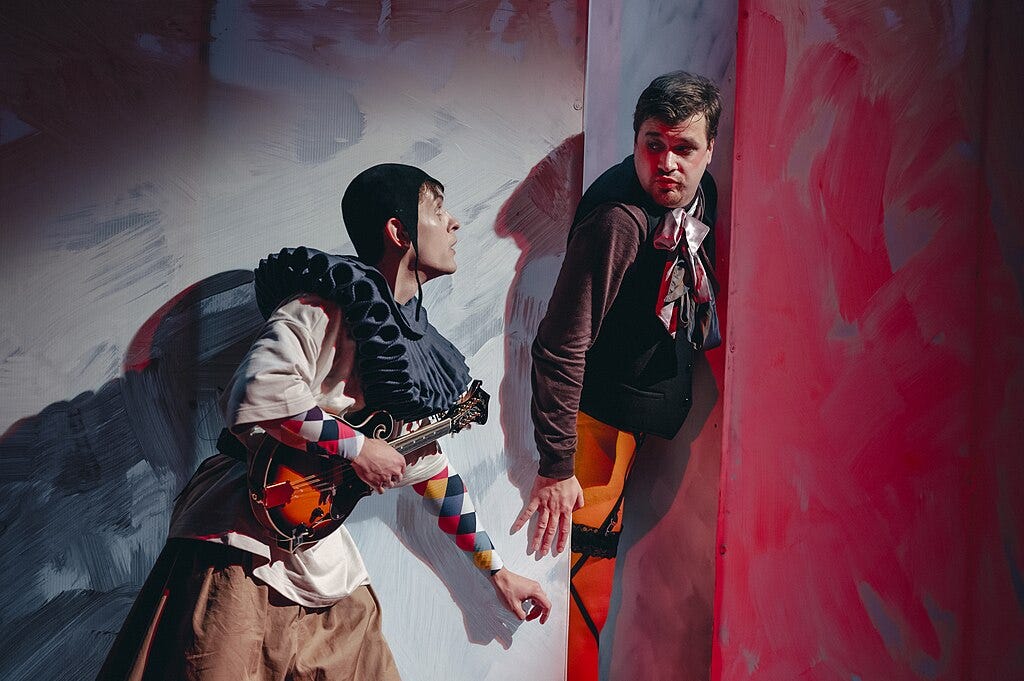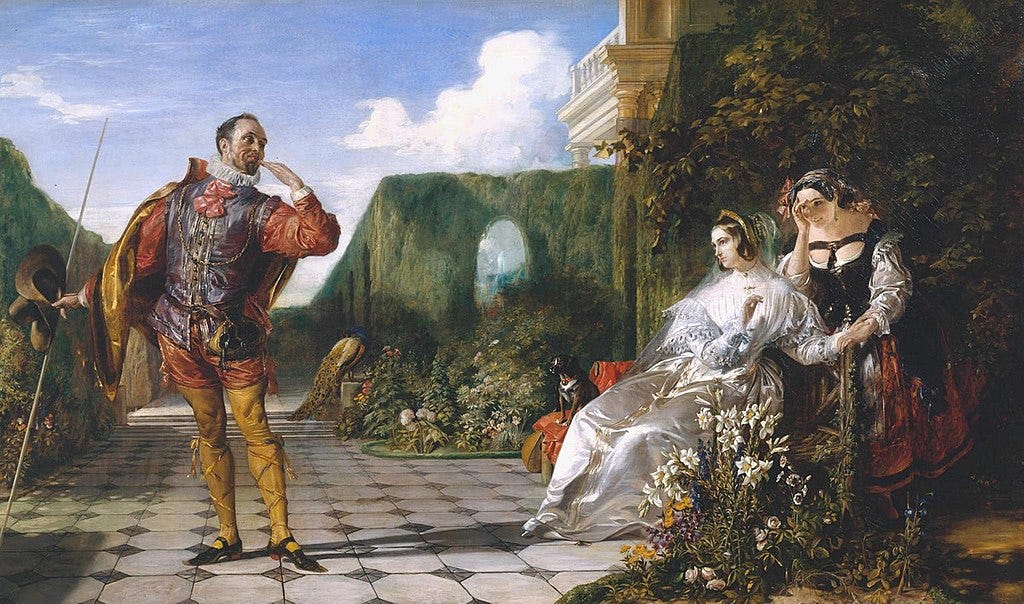The other day we were listening to a podcast in the car and an ad came on for what I assume is an app called Caesar’s Palace Online Casino. In Michigan lately we’re deluged with online gambling advertisements—I think it’s predatory, and that’s a conversation for another day. But whoever wrote this particular ad had their finger on the human psyche in a way that I think calls them to a higher vocation than online-casino ad copywriting. The hook was simple: “Tonight’s not just another night.”
The line captured my imagination. That’s what we all want to hear, isn’t it? In our heart of hearts, many of us feel that adult life is boring. Tonight is always just another night: the routine of a silent dinnertime or one overrun with the needs of kids, watching a show to fill up the gap between dinner and sleeping because what else is there to do, scrolling on your phone too late and then getting up too early. We all crave finding out that today is somehow special, that tonight is a night when something different will happen.
What was particularly compelling about this message, though, was the idea that you could choose to make this night not just another night. Through the simple step of downloading the Caesar’s Palace Online Casino App, tonight could be transformed into something extraordinary. You could be transformed into something extraordinary.
The play Twelfth Night is home to one of Shakespeare’s most loathsome villains: the aptly-named Malvolio. The steward for the household of a rich lady named Olivia, Malvolio is a puritanical stooge, constantly upbraiding other characters for their perceived moral failures. Secretly in love with his mistress, Malvolio is deceived by his enemies into believing that Olivia shares his passion, and in one of the most iconic scenes in all of Shakespeare’s plays, appears in yellow stockings and cross-gartered to claim her love. He is imprisoned for insanity, where the other characters continue to mock and torture him. Eventually, the trickery is revealed.
Malvolio’s troubles don’t begin with the letter, though. Even before Sir Toby and Maria’s plan is set into action, he is already fantasizing about marrying his mistress in a delusional monologue:
’Tis but fortune; all is fortune. Maria once told me [Olivia] did affect me; and I have heard herself come thus near, that should she fancy, it should be one of my complexion. Besides, she uses me with a more exalted respect than anyone else that follows her. What should I think on’t? . . . There is example for ’t. The lady of the Strachy married the yeoman of the wardrobe. (2.5)
From these generalized theories he moves into more concrete delusions: “Having been three months married to her, sitting in my state . . . Calling my officers about me, in my branched velvet gown; having come from a daybed, where I have left Olivia sleeping—” (2.5)
Then, primed by his own fantasy, he finds the letter. In it, perhaps the most famous line of the play is written in the voice of a supposed Olivia, encouraging him to rise above his station: “In my stars I am above thee, but be not afraid of greatness. Some are born great, some achieve greatness, and some have greatness thrust upon ’em” (2.5). For Malvolio, tonight isn’t just another night.

Joseph Pearce argues that Malvolio is a justifiably vicious caricature of the Puritans who condemned Shakespeare’s plays. One of the best lines in the play is, of course, Sir Toby’s “Dost thou think, because thou art virtuous, there shall be no more cakes and ale?” (2.3), and given Shakespeare’s experience with the Puritans, there seems to be every excuse in the world to poke fun at them here.
I’m not sure, though, that Shakespeare himself enters into Malvolio’s humiliation with unreflective glee. The characters who torment him express the desire for his death: even Maria says in 3.2, “I have dogged him like his murderer.” The fool Feste mocks Malvolio by pretending to be a curate who is visiting him in prison, and in this scene—which can be painful to watch in performance—even Sir Toby seems to have second thoughts: “I would we were well rid of this knavery” (4.2). Malvolio complains of the darkness of his prison, as Feste falsely denies that it is dark: “I say this house as dark as ignorance, though ignorance were as dark as hell; and I say there was never man thus abused” (4.2). His final request of Feste is literally to beg for light, in addition to a pen and paper to write a letter defending himself.
In Malvolio’s final speech—which takes up a great deal of the last scene—he begs Olivia for some reason for his torment:
And, acting this in an obedient hope,
Why have you suffered me to be imprisoned,
Kept in a dark house, visited by the priest,
And made the most notorious geck and gull
That e’er invention played on? Tell me why? (5.1)
Since Olivia had no part in the deception, she of course has no reasons for him. And Malvolio finds no final resolution—Fabian intervenes to claim that Malvolio’s wrongs far outweigh their own mockery of him in “sportful malice,” and Malvolio’s final line in the play is “I’ll be revenged on the whole pack of you!” (5.1).

It seems counterintuitive to sympathize with Malvolio, but Shakespeare leads us to do so. His spirit of grand delusion is laughable, but who among us hasn’t indulged in a little bit of unhealthy fantasizing? Are we really so different from him? Aren’t we merely lucky that other people weren’t there to witness our humiliation?
In Chapter 6 of An Experiment in Criticism, C.S. Lewis explores the meaning of the term “fantasy.” Interestingly, he begins with the concept of “delusion,” which is precisely what Malvolio experiences—twisting reality into a completely false perception of events.1 Then he divides up some more common tendencies of the human imagination, all of which fall under what he calls “castle-building”: firstly, “Morbid Castle-building,” where a fantastical version of events in which the person imagining them is the hero becomes “the prime consolation, and almost the only pleasure, of the dreamer’s life”; and secondly, what Lewis broadly calls “Normal Castle-building.”
“Normal Castle-building” is “the same activity indulged in moderately and briefly as a temporary holiday or recreation.” In other words, dreaming. (“Whether a man would be wiser to live with none of this at all in his life, we need not perhaps discuss, for no one does,” Lewis says in a matter-of-fact aside.) Normal Castle-building itself falls into two categories: “Egoistic” and “Disinterested.” In Egoistic Castle-building, “the day-dreamer himself is always the hero and everything is seen through his eyes. It is he who makes the witty retorts, captivates the beautiful women, owns the ocean-going yacht, or is acclaimed as the greatest living poet.” In Disinterested Castle-building, “the day-dreamer is not the hero of the day-dream or perhaps not present in it at all.” Lewis gives the example of a man dreaming of the scenes of an Alpine holiday: not dreaming of himself as the protagonist of all these experiences, but rather “as spectator. As his attention would be fixed not on himself but on the mountains if he were really in Switzerland, so in the castle-building his attention is fixed on the imagined mountains.”

Most of us aren’t delusional (though maybe we have a bit of what the kids today call “delulu”). And I think few of us suffer from morbid castle-building, either. An addiction to your own imagination is difficult to maintain in a time when our phones are constantly ready to hand with more appealing objects for addiction. But if you’re like me, reading the definition of “egoistic castle-building” is a little unnerving, and reading about “disinterested castle-building” is sobering. I’m frequently the heroine of the stories my imagination tells—even when they’re stories that I don’t like, stories where the heroine is put-upon and persecuted, or faces untold and overwhelming dangers at some unspecified time in the future. Mental health experts tend to point out the inherent egoism of catastrophic thinking: why are you so special that this horrendous catastrophe will happen to only you?
As for the other kind of castle-building, sometimes it happens. I occasionally wander among visions of what I’ll see when we travel to Italy this summer or what life will be like when we move to the East Coast this fall. Even these fantasies feel more expansive, more life-giving, as if you can breathe in them. But Lewis’ description of disinterested castle-building reminded me of the heights to which imagination can rise:
I am probably one of many who, on a wakeful night, entertain themselves with invented landscapes. I trace great rivers from where the gulls scream at the estuary, through the windings of ever narrower and more precipitous gorges, up to the barely audible tinkling of their source in a fold of the moors. But I am not there myself as explorer or even as tourist. I am looking at that world from outside.
Such a facility with imagination, something I had as a child (Lewis mentions children’s ease with this), now feels far away, rusty, unpracticed. I don’t know when I stopped doing it. But I have my suspicions: I think it was when adult life tried to promise me that tonight’s not just another night.
One of the things that we forget about childhood is that, if we were lucky, we spent a lot of it being very bored. Great imaginative castles could arise from that boredom. Adulthood tends to focus our attention on the brass tacks of our own lives, and the firehose of emotions that comes with the teenage years tends, I think, to awaken us to an egoism that’s hard to lift when those hormones are more balanced. What’s more, modern society constantly encourages egoistic castle-building. Aspirational Instagram accounts fuel it. Constant marketing of gadgets and clothes and cars that will magically transform you into someone else fuel it. Even some popular platitudes about self-care and therapy-speak about boundaries and attachment theory can fuel a sense that you are the meaning of not only your own, but everyone else’s existence. Gen Z is actually very aware of this phenomenon as well—they call it “main character syndrome.”
In After Virtue, Alasdair MacIntyre suggests that being a “main character” in our own lives is perhaps unavoidable, but we shouldn’t forget that our lives still exist within a network of others’ lives:
Each of us being a main character in his own drama plays subordinate parts in the dramas of others, and each drama constrains the others. In my drama, perhaps, I am Hamlet or Iago or at least the swineherd who may yet become a prince, but to you I am only A Gentleman or at best Second Murderer, while you are my Polonius or my Gravedigger, but your own hero. (After Virtue, 213-214)
This, of course, is the mistake that Malvolio makes. His delusions spin out of control because he refuses to be a part of the community around him—he does not engage with reality in the form of other people, whose gentler mockeries might have brought him down to earth sooner, instead standing in judgment over them and choosing his own fantastical reality. It’s hard to have an unshakable sense of being the main character when you are regularly interacting with others. It’s easy to develop one when you intentionally isolate yourself, or when you are constantly being served content tailored to your particular tastes and almost never come across any contradictions to your self-perception.
This week, we’re within the Jewish holiday of Passover. At the Passover Seder, the oral tradition is preserved in the form of a ritual question posed by the youngest attendee: “Why is this night different from all other nights?” The others respond:
We were slaves to Pharaoh in Egypt, and God brought us out with a strong hand and an outstretched arm. And if God had not brought our ancestors out of Egypt, we and our children and our children’s children would still be subjugated to Pharaoh in Egypt. Even if we were all old and wise and learned in Torah, we would still be commanded to tell the story of the Exodus from Egypt. And the more we talk about the Exodus from Egypt, the more praiseworthy we are.
The good news about living in a world where our story is affected by the stories of others is that, sooner or later, we will be caught up into a story that is bigger than any of us. When we are, some nights will be different from other nights. Not exactly when we want them—we’ll probably have to endure nights of boredom when we’d rather have a main-character experience, when we have to learn to use our imagination differently—but they will come. And we will be rescued from the dark prison of our egoism.
In the words of the traditional Easter Vigil liturgy’s Exsultet,
This is the night
of which it is written:
The night shall be as bright as day,
dazzling is the night for me,
and full of gladness.The sanctifying power of this night
dispels wickedness, washes faults away,
restores innocence to the fallen, and joy to mourners,
drives out hatred, fosters concord, and brings down the mighty.
On this, your night of grace, O holy Father,
accept this candle, a solemn offering,
the work of bees and of your servants’ hands,
an evening sacrifice of praise,
this gift from your most holy Church. . . .O truly blessed night,
when things of heaven are wed to those of earth,
and divine to the human.
He actually mentions Malvolio in the chapter in a different context: “For one thing, some of them like comic stories. I do not think that the enjoyment of a joke is ever, for them or for anyone else, a form of castle-building. We certainly do not wish to be the crossgartered Malvolio or Mr Pickwick in the pond. We might conceivably say ‘I wish I’d been there to see’; but this is only to wish ourselves as spectators—which we already are—in what we suppose to be a better seat.” (An Experiment in Criticism 34)






An excellent essay! I appreciate when the deeper themes of Twelfth Night are explored. It’s one of my favorite Shakespeare plays, but it’s understandably easy to overlook it as “just another gaudy comedy”.
Such a delight, Emily! The insight into interior fantasizing and castle building is spot on.